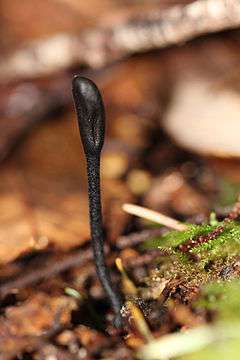Trichoglossum hirsutum
| Trichoglossum hirsutum | |
|---|---|
 | |
| Trichoglossum hirsutum | |
| Scientific classification | |
| Kingdom: | Fungi |
| Division: | Ascomycota |
| Subdivision: | Pezizomycotina |
| Class: | Geoglossomycetes |
| Order: | Geoglossales |
| Family: | Geoglossaceae |
| Genus: | Trichoglossum |
| Species: | Trichoglossum hirsutum |
| Binomial name | |
| Trichoglossum hirsutum (Pers.) Boud. 1907 | |
Trichoglossum hirsutum is a family of fungi in the genus Trichoglossum. They are commonly called black earth tongues.
Description
Trichoglossum hirsutum makes a black club shaped fungus 3 – 8 cm high. The spores are produced on the enlarged upper part, which is 5 to 8 mm wide, up to 2 cm high, flattened, spearhead-shaped to ellipsoid and finely velvety. The flesh is thin, tough and brownish. The stem is up to 6 cm long and 2 – 3 mm thick, cylindrical and velvety. Spores 80 - 195 x 5 - 7 micrometers, cylindric-clavate, broadest in the middle and tapering to the blunt ends, with 15 septa. The asci each have 8 spores. The paraphyses are brown, cylindric and coiled at the tips.[1]
Systematics
Trichoglossum hirsutum was first described as Geoglossum hirsutum in 1797 by Persoon. In 1907, Jean Louis Émile Boudier published it as Trichoglossum hirsutum.[2]
The epithet hirsutum refers to the fine hairs that cover the fruit body.
Location
Trichoglossum hirsutum is found in woodlands in North America, Europe, Macaronesia [3] and Africa.[4] It is listed as an endangered species in Lithuania.[5]
Similar Species
Trichoglossum walteri is similar but has spores 50 - 115 micrometers, with 7 divisions.[6]
- Trichoglossum hirsutum stipe
- Trichoglossum hirsutum
 Trichoglossum hirsutum spores 400x phase contrast
Trichoglossum hirsutum spores 400x phase contrast Trichoglossum hirsutum spores 400x brightfield
Trichoglossum hirsutum spores 400x brightfield
External links
- Trichoglossum hirsutum in Index Fungorum
- Trichoglossum hirsutum at mushroomobserver.org
- Trichoglossum hirsutum at California Fungi
- Key to Club Fungi in the PNW
References
- ↑ "Trial field key to CLUB-SHAPED FUNGI in the Pacific Northwest".
- ↑ "Index Fungorum - Trichoglossum Genus".
- ↑ Richard P. Korf (1981). "A preliminary discomycete flora of Macronesia". Mycotaxon (13): 361–366. ISSN 0093-4666.
- ↑ Clovis Douanla-Meli & Ewald Langer (2005). "Notes on Discomycetes: New species and new records from Cameroon". Mycotaxon (92): 223–237. ISSN 0093-4666.
- ↑ List of extinct and endangered species of Lithuania
- ↑ Sanshi Imai (1940). "The Geoglossaceae of Norway". Annales Mycologici (38): 277.